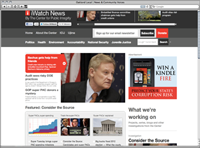Charles Lewis founded the organization after leaving 60 Minutes in 1988 because he felt that some of the biggest stories of that time, from the savings and loan scandal to Iran-Contra, were simply not being reported. “Iran-Contra broke in Lebanon and most American reporters learned about it because the attorney general discussed it at a news conference,” Lewis says. “That [was] a very bad sign.” By establishing a nonprofit organization free from the burden of having to file dozens of stories each day, Lewis let his team of journalists work exclusively on what they did best: investigative reporting.
One of the Center’s most notable recent projects was an exhaustive effort titled “Who’s Behind the Financial Meltdown?: The Top 25 Subprime Lenders and their Wall Street Backers.” The report spawned multiple articles, data maps, and interactive features. It also revealed how the top subprime lenders that triggered the financial meltdown received billions from the bailout, a conclusion that reverberated throughout Washington. In 2008, the Center embarked on a similarly ambitious mission when it created a fully searchable database of public pronouncements about the war in Iraq made by former President Bush and his top officials. In total, the Center found 935 false statements that it dismantled on its site. Projects like these, while important on their own, have also prompted other journalists to write their own stories on the topics.
The Center’s work is funded mostly through large grants. For instance, in 2009, CPI received $2.4 million from the Ford Foundation and $18 million from Greenlight Capital LLC, on top of five other very lucrative gifts, according to its tax statement. The Center’s reporting power also received an additional boost on October 19, 2010, when it announced that it was merging with the Huffington Post Investigative fund, bringing the organization’s total number of staffers to fifty.
While the Center has long been a staple of American investigative journalism, it has also branched out globally. In 1997, CPI launched the International Consortium of Investigative Journalists (ICIJ), an organization of over 100 reporters working in fifty countries. The ICIJ is the only group of its kind, and has paired with major news organizations around the world, including Britain’s BBC and Brazil’s Fohla de São Paulo.
In 2010, ICIJ produced “Looting the Seas,” a multi-part, twelve-reporter story that explored “how overfishing, fraud and negligence plundered the majestic bluefin tuna.” Another project, “The Global Climate Change Lobby,” investigated the struggle to pass strong environmental legislation amidst an international lobbying war by big polluters.
In addition to expanding its reporting network across the globe, The Center for Public Integrity has also begun recruiting Internet users to help with its reporting. After the Supreme Court’s Citizens United ruling, CPI enlisted its readers to help report on the corporate influence in the 2010 midterm elections, a project which yielded a major story on the subject that was picked up by the National Journal.
On the potential for crowdsourcing in investigative news, Lewis says: “I strongly believe this is a fundamental part of the future.”
 WASHINGTON, DISTRICT OF COLUMBIA — The Center for Public Integrity celebrated its twentieth anniversary in 2010 with a YouTube video detailing its many accomplishments. The organization has won more than forty national journalism awards, pursued more than seventy major investigative projects, published sixteen books, and, perhaps most significantly, has been cited in print and electronic media more than 15,000 times. Now, the Center has started to embrace the complexity of the web.
WASHINGTON, DISTRICT OF COLUMBIA — The Center for Public Integrity celebrated its twentieth anniversary in 2010 with a YouTube video detailing its many accomplishments. The organization has won more than forty national journalism awards, pursued more than seventy major investigative projects, published sixteen books, and, perhaps most significantly, has been cited in print and electronic media more than 15,000 times. Now, the Center has started to embrace the complexity of the web.
